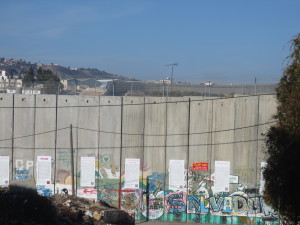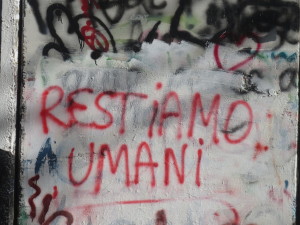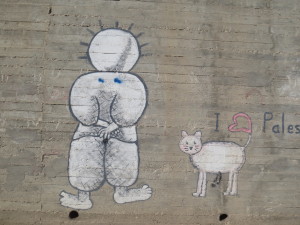Bethlehem, the wall and the hands made of bread
giugno 26, 2014 in Palestina, Traduzioni da Anna Zorzi
Written by Sonia Trovato, translated by Anna Zorzi ![]()
I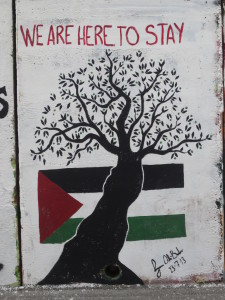 ch bin ein Berliner stated J.F.Kennedy on his visit to West Berlin in 1963. Nowadays the American State Secretary John Kerry, who in his self-assigned role of the guardian of the world has been monitoring the process of peace between Israel and the West Bank, would never define himself as a Palestinian. If he did, the whole Jewish communities in the world would protest, Netanyahu would have a heart attack and Israel would feel as a betrayed lover. Yet the Palestinian Wall, which separates the Jewish State from the West Bank, stretches much farther than the Berlin Wall : according to the project the Jewish monster will be more than 700 km long and 8/10 km high, while the German one was 106 km long and 3.6 km high. Except for some timid complains from the Court of Aja, neither heads of state nor hordes of vacationers look ashamed at the sight of a city scarred by this layer of reinforced concrete. Yes, we ‘ve seen the Wall – a couple from the Italian region Marche replies carelessly outside the Basilica of the Nativity – and yesterday we’ve been to Hebron. How curious it is.- Curious? What do they mean by curious? Is it curious the fact that the main street of a city of Arab origins is interdicted to his Palestinian inhabitants? Or that young people under –age are continually arrested? Or that houses are searched at night and shops confiscated? Is it curious that 6 hundred fanatical fascists rule over 150 thousand unarmed people? You go away before starting a violent argument on the contradictions of these package tours, which organize pilgrimages to the Holy Land and, at the same time, sweep the apartheid, the violence and the prevarication under the carpet. Even if Bethlehem lies in the West Bank, the tourism is monopolized by Israel, which tailors itineraries to its own convenience for the tourists just at their arrival at Tel Aviv airport, taking away a profitable source of livelihood from the Palestinians and preventing travellers from getting to know the injustices perpetrated in the name of the six-pointed star of David.
ch bin ein Berliner stated J.F.Kennedy on his visit to West Berlin in 1963. Nowadays the American State Secretary John Kerry, who in his self-assigned role of the guardian of the world has been monitoring the process of peace between Israel and the West Bank, would never define himself as a Palestinian. If he did, the whole Jewish communities in the world would protest, Netanyahu would have a heart attack and Israel would feel as a betrayed lover. Yet the Palestinian Wall, which separates the Jewish State from the West Bank, stretches much farther than the Berlin Wall : according to the project the Jewish monster will be more than 700 km long and 8/10 km high, while the German one was 106 km long and 3.6 km high. Except for some timid complains from the Court of Aja, neither heads of state nor hordes of vacationers look ashamed at the sight of a city scarred by this layer of reinforced concrete. Yes, we ‘ve seen the Wall – a couple from the Italian region Marche replies carelessly outside the Basilica of the Nativity – and yesterday we’ve been to Hebron. How curious it is.- Curious? What do they mean by curious? Is it curious the fact that the main street of a city of Arab origins is interdicted to his Palestinian inhabitants? Or that young people under –age are continually arrested? Or that houses are searched at night and shops confiscated? Is it curious that 6 hundred fanatical fascists rule over 150 thousand unarmed people? You go away before starting a violent argument on the contradictions of these package tours, which organize pilgrimages to the Holy Land and, at the same time, sweep the apartheid, the violence and the prevarication under the carpet. Even if Bethlehem lies in the West Bank, the tourism is monopolized by Israel, which tailors itineraries to its own convenience for the tourists just at their arrival at Tel Aviv airport, taking away a profitable source of livelihood from the Palestinians and preventing travellers from getting to know the injustices perpetrated in the name of the six-pointed star of David.
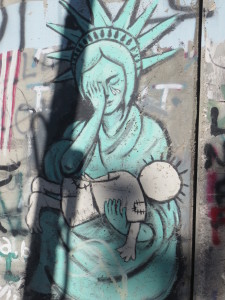 Perhaps that old Palestinian was right when, on seeing the graffiti writer Bansky at work, he told him to go home because he was making the wall beautiful with his graffiti and Palestinians don’t want it beautiful because they hate it. The Londoner replied that a 700-km- long wall needs painting and nothing else. Maybe the Wall had to be left unpainted, it must be shown in its ugliness if you want to shock the absent-minded tourist who takes pictures of it as if it was a piece of work exhibited at the Louvre or the Uffizi gallery. Yet, while walking along this monstrous thing you feel enchanted at the ability to narrate the beauty in the tragedy. If people were taught the beauty they would be given a weapon against resignation, fear and conspiracy of silence- said Peppino Impastato. Maybe the decorated Wall you are walking along wants to tell you this: the beauty and the art can be antidotes to the horror of those who don’t know the beauty, but only military training, check-points and barbed wire. So that old Palestinian who scolded Bansky for his graffiti was not right because Palestinians have a powerful weapon against fear, resignation and conspiracy of silence , they have the same weapon which gives gazawi courage and makes them move their legs in extraordinary parkour in front of the snipers.
Perhaps that old Palestinian was right when, on seeing the graffiti writer Bansky at work, he told him to go home because he was making the wall beautiful with his graffiti and Palestinians don’t want it beautiful because they hate it. The Londoner replied that a 700-km- long wall needs painting and nothing else. Maybe the Wall had to be left unpainted, it must be shown in its ugliness if you want to shock the absent-minded tourist who takes pictures of it as if it was a piece of work exhibited at the Louvre or the Uffizi gallery. Yet, while walking along this monstrous thing you feel enchanted at the ability to narrate the beauty in the tragedy. If people were taught the beauty they would be given a weapon against resignation, fear and conspiracy of silence- said Peppino Impastato. Maybe the decorated Wall you are walking along wants to tell you this: the beauty and the art can be antidotes to the horror of those who don’t know the beauty, but only military training, check-points and barbed wire. So that old Palestinian who scolded Bansky for his graffiti was not right because Palestinians have a powerful weapon against fear, resignation and conspiracy of silence , they have the same weapon which gives gazawi courage and makes them move their legs in extraordinary parkour in front of the snipers.
80% of the land of Bethlehem has been taken away by the Wall which, like a monster, has gulped it and then spit it out completely unrecognizable ,deformed and raped. That’s the personal experience of Claire Anastas: she owns a souvenir shop and one day unexpectedly she found her own house surrounded by the layer of reinforced concrete and from that moment on her own privacy violated by a near-by control tower.
Israel is at war against terrorism to defend its own houses and the Israeli Government has decided to uproot the infrastructure of terrorism present in Palestinian territory – proclaimed Natanyahu in 2002. It is bizarre that a defence barrier which should uproot terrorism takes water, land, houses, time and work of an entire population. And Christian institutions and proprieties are harassed as well, but if they underwent half of the harassment by an Arab state, they would be supported by the whole western world and the complete UN army would leave on a “mission of peace” in their defence.
The Wall is not the only note out of tune in the large square in Bethlehem decorated with Christmas lights. The town where Jesus Christ was born is also the place where the biggest refugee camp of the West Bank lies: Aida. 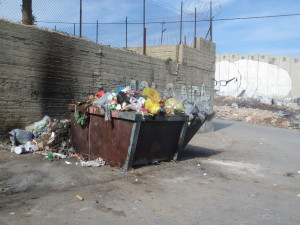 The name means “she who will come back”, but the paradox of being born as a refugee in one’s own land is still present. Aida looks even worse than the refugee camp of Balata in Nablus: it develops in a hidden ravine, opposite the Wall, among stacked bags of garbage and ash residues. The UNRWA personnel is on strike and the refugees cope with the waste disposal by burning it, this way they make their precarious living conditions even worse because of the risk of dioxin intossication.* In addition to the discontent of the employees of the UNO there is also the tension for the official visit and statements of John Kerry, who has proposed as a solution to the problem of the refugees their moving into the desert lands of Australia or other remote places.
The name means “she who will come back”, but the paradox of being born as a refugee in one’s own land is still present. Aida looks even worse than the refugee camp of Balata in Nablus: it develops in a hidden ravine, opposite the Wall, among stacked bags of garbage and ash residues. The UNRWA personnel is on strike and the refugees cope with the waste disposal by burning it, this way they make their precarious living conditions even worse because of the risk of dioxin intossication.* In addition to the discontent of the employees of the UNO there is also the tension for the official visit and statements of John Kerry, who has proposed as a solution to the problem of the refugees their moving into the desert lands of Australia or other remote places.
Just like in Jerusalem, you feel too detached from the carefree mood of a holiday-maker and you make up your mind to look for the kiosk which makes the best falafel in Palestine, as Mike told you, instead of visiting the Basilica of the Nativity. You are consulting your city-plan when a pedlar stops you and shows you something roughly wrapped in a piece of paper and smelling disgusting. That’s monkey’s meat– proclaims proudly the lean moustached man. You look at him in horror and immediately imagine the little animal you longed for as your secret companion when you were a child now chopped into pieces and there in a piece of stinking paper. Monkey?! Monkey?! – No,no,no, sorry! Donkey! And he makes the sound of a donkey. Sorry, but I’m vegetarian.- Yes, yes, no vegetables; meat. First you give him a puzzled look, then you imagine the comic scene of yourself standing in front of him: the moustached, lean man miming a donkey and you observing him , the city map clenched between your teeth to prevent your camera and the stinking paper from falling down. You can ‘t help bursting into a laugh, which seriously offends the makeshift butcher, who takes his chopped up donkey back and goes away testily.
n the second part of the day you can see the real devastating effects of the Israeli conquest policies on the landscape. From the top of the hill where the Christian village of Beit Jala lies, you can see a monumental example of territory destruction. 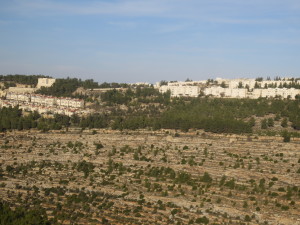 What up to 1967 was one of the greenest and quietest corners of Palestine has now become an endless row of Swiss-like red roofs, the unmistakable mark of the occupation. Close to the hill you can spot a long road with a tunnel, maybe the most modern infrastructure you ‘ve ever seen in the West Bank. Mike tells you that that street is for the Israelis and the settlers only. Beit Jala, well-known in the world for its oil and Cremisa n wine, is suffocated between two illegal settlements and threatened by the new project of the route of the Wall, which would deprive 58 families of their own lands to the benefit of the Israeli State. For this reason every Friday Father Ibrahim Shomali celebrates a protest Mass, which draws both churchgoers and activists onto a wonderful piece of land of olive trees.
What up to 1967 was one of the greenest and quietest corners of Palestine has now become an endless row of Swiss-like red roofs, the unmistakable mark of the occupation. Close to the hill you can spot a long road with a tunnel, maybe the most modern infrastructure you ‘ve ever seen in the West Bank. Mike tells you that that street is for the Israelis and the settlers only. Beit Jala, well-known in the world for its oil and Cremisa n wine, is suffocated between two illegal settlements and threatened by the new project of the route of the Wall, which would deprive 58 families of their own lands to the benefit of the Israeli State. For this reason every Friday Father Ibrahim Shomali celebrates a protest Mass, which draws both churchgoers and activists onto a wonderful piece of land of olive trees.
The religious service starts and many travelling companions join in the prayer: it’s a lively, colourful prayer, a hybrid prayer mixing different languages from the Italian to the Arab, from the English to the Hebrew. Other companions, the most anticlerical ones, step aside. 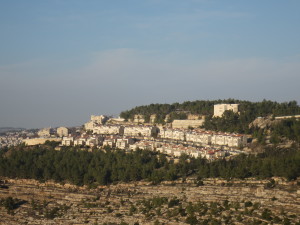 You are joining the second group when you notice Mike, sitting alone on a low wall and you decide to go to him. While the others are singing their Salam Aleikum , you feel you share thoughts and emotions with this man , who has become the grandfather or the Dad of the group of travellers. And you force back your tears while thinking about your imminent return home. How can you come back home? How can you go back to your work or to your friends and leave Mike and his family and all the others to their fight for a bit of dignity, for a life free from the terror of document control, from the arbitrary arrest of a relative or a friend, from a military raid? The week you have spent here has been as intense as your whole life and now, suddenly, your past 26 years – years of hard work, study and close friendship – seem to fade away, they seem an unforgivable proof of a privilege you have never understood: the privilege to be born in a wealthy country and in peace. It will take you months to realize that these privileges must be defended because they are inalienable rights everybody should have: the right to a house, to education, to health, to affections. Meeting these people, their strength to fight back and their love for life will help me to live better when I’m back home in Italy told you a young volunteer of Operazione Colomba in At-Tuwani.
You are joining the second group when you notice Mike, sitting alone on a low wall and you decide to go to him. While the others are singing their Salam Aleikum , you feel you share thoughts and emotions with this man , who has become the grandfather or the Dad of the group of travellers. And you force back your tears while thinking about your imminent return home. How can you come back home? How can you go back to your work or to your friends and leave Mike and his family and all the others to their fight for a bit of dignity, for a life free from the terror of document control, from the arbitrary arrest of a relative or a friend, from a military raid? The week you have spent here has been as intense as your whole life and now, suddenly, your past 26 years – years of hard work, study and close friendship – seem to fade away, they seem an unforgivable proof of a privilege you have never understood: the privilege to be born in a wealthy country and in peace. It will take you months to realize that these privileges must be defended because they are inalienable rights everybody should have: the right to a house, to education, to health, to affections. Meeting these people, their strength to fight back and their love for life will help me to live better when I’m back home in Italy told you a young volunteer of Operazione Colomba in At-Tuwani. 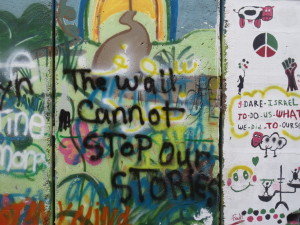 Maybe Mikes has caught a glimpse on your face of your melancholy thoughts because he reaches out and strokes your cheek tenderly and good-naturedly. His hand reminds you of the description made by Calvino of Cugino, the man that in Sentieri di ragno leads the child Pin to his rickety band of partisans. The man held him in his hand: it is a large hand, warm and soft, it is as if it is made of bread. Mikes has soft hands like bread and this comparison makes you smile as you are in the town which, in Hebrew, represents the “House of Bread”. If you turn your back to the building atrocities of the surrounding hills you can dream of a Palestinian Resistance which has become literature, you can dream of Mike’s and all the others’ hands of bread which have turned into mythical parts of a partisan epic which you wish would lead the Palestinian Resistance to finally win.
Maybe Mikes has caught a glimpse on your face of your melancholy thoughts because he reaches out and strokes your cheek tenderly and good-naturedly. His hand reminds you of the description made by Calvino of Cugino, the man that in Sentieri di ragno leads the child Pin to his rickety band of partisans. The man held him in his hand: it is a large hand, warm and soft, it is as if it is made of bread. Mikes has soft hands like bread and this comparison makes you smile as you are in the town which, in Hebrew, represents the “House of Bread”. If you turn your back to the building atrocities of the surrounding hills you can dream of a Palestinian Resistance which has become literature, you can dream of Mike’s and all the others’ hands of bread which have turned into mythical parts of a partisan epic which you wish would lead the Palestinian Resistance to finally win.
Here, on the slopes of the hills, in front of the sunset and the passing of the time,/ near the gardens with their broken shadows,/ we do what prisoners do,/ we do what the unemployed do: / we grow the hope.
*Nor complaints or reactions have come from Roberto Saviano, who has built a lucky career writing of toxic spills in the area of Caserta and Naples, but who obviously considers the dioxin in Palestine less harmful than that one in Naples.

